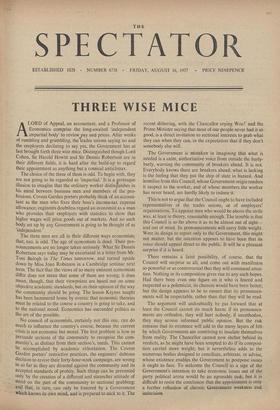THREE WISE MICE
ALORD of Appeal, an accountant, and a Professor of Economics comprise the long-awaited 'independent impartial body' to review pay and prices. After weeks of rumbling and grumbling, the trades unions saying no and the employers declining to say yes, the Government has at last brought forth three wise mice. Distinguished though Lord Cohen, Sir Harold Howitt and Sir Dennis Robertson are in their different fields, it is hard after the build-up to regard their appointment as anything but a comical anticlimax.
The choice of the three of them is odd. To begin with, they are not going to be regarded as 'impartial.' It is agrotesque illusion to imagine that the ordinary worker distinluishes in his mind between business men and members of the pro- fessions. Covent Garden porters probably think of an accoun- tant as the man who fixes their boss's income-tax expense allowance; engineers doubtless regard an economist as a man who provides their employers with statistics to show that higher wages will price goods out of markets. And no such body set up by any Government is going to be thought of as `independent.'
The three men are all in their different ways economists; that, too, is odd. The age of economists is dead. Their pro- nouncements are no longer taken seriously. What Sir Dennis Robertson says today may be excoriated in a letter from Mr. Tom Balogh in The Times tomorrow, and turned upside down by Miss Joan Robinson in a Cambridge seminar next term. The fact that the views of so many eminent economists differ does not mean that some of them are wrong; it does mean, though, that their viewpoints are based not on some objective academic standards, but on their opinion of the way the community should be going. The lesson Keynes taught has been hammered home by events; that economic theories must be related to the course a country is going to take, and to the national mood. Economics has succeeded politics as the art of the possible.
No council of economists, certainly not this one, can do much to influence the country's course, because the current crisis is not economic but moral. The first problem is how to Persuade sections of the community to recognise the com- munity's, as distinct from their section's, needs. This cannot be accomplished by academic exhortation. The Covent Garden porters' restrictive practices, the engineers' dubious decision to revive their forty-hour-week campaign, are wrong in so far as they are directed against the community and its accepted standards of probity. Such things can be prevented only by the creation of a different and stauncher attitude of mind on the part of the community to sectional grabbing; and that, in turn, can only be fostered by a Government Which knows its own mind, and is prepared to stick to it. The recent dithering, with the Chancellor crying Woe! and the Prime Minister saying that most of our people never had it so good, is a direct invitation to sectional interests to grab what they can when they can, in the expectation that if they don't somebody else will.
The Government is mistaken in imagining that what is needed is a calm, authoritative voice from outside the hurly- burly, warning the community of breakers ahead. It is not. Everybody knows there are breakers ahead; what is lacking is the feeling that they put the ship of state in hazard. And homilies from this Council, whose Government origin renders it suspect to the worker, and of whose members ,the worker has never heard, are hardly likely to induce it.
This is not to argue that the Council ought to have included representatives of the trades unions, or of employers' organisations. To appoint men who would be above the strife was, at least in theory, reasonable enough. The trouble is that this Council is so far above it as to be almost out of sight— and out of mind. Its pronouncements will carry little weight. Were its design to report only to the Government, this might not matter; but the intention appears to have been that its voice should appeal direct to the public. It will be a pleasant surprise if it is heard.
There remains a faint possibility, of course, that the Council will surprise us all, and come out with manifestos so powerful or so controversial that they will command atten- tion. Nothing in its composition gives rise to any such hopes. Had there been even one figure on it who is feared and respected as a polemicist, its chances would have been better; but the design appears to be to ensure that its pronounce- ments will be respectable, rather than that they will be read.
The argument will undoubtedly be put forward that at least the Council cannot do much harm; if its pronounce- ments are orthodox, they will hurt nobody; if unorthodox, they may arouse informed public opinion. But the risk remains that its existence will add to the many layers of felt- by which Governments are contriving to insulate themselves from reality. The Chancellor cannot now shelter behind its verdicts, as he might have been tempted to do if its composi- tion carried more weight; but it nevertheless adds to the numerous bodies designed to conciliate, arbitrate, or advise, whose existence enables, the Government to postpone issues it ought to face. To welcome the Council as a sign of the Government's intention to take economic issues out of the party political arena would be an agreeable task; but it is difficult to resist the conclusion that the appointment is only a further reflection of chronic Government weakness and indecision.






























 Previous page
Previous page